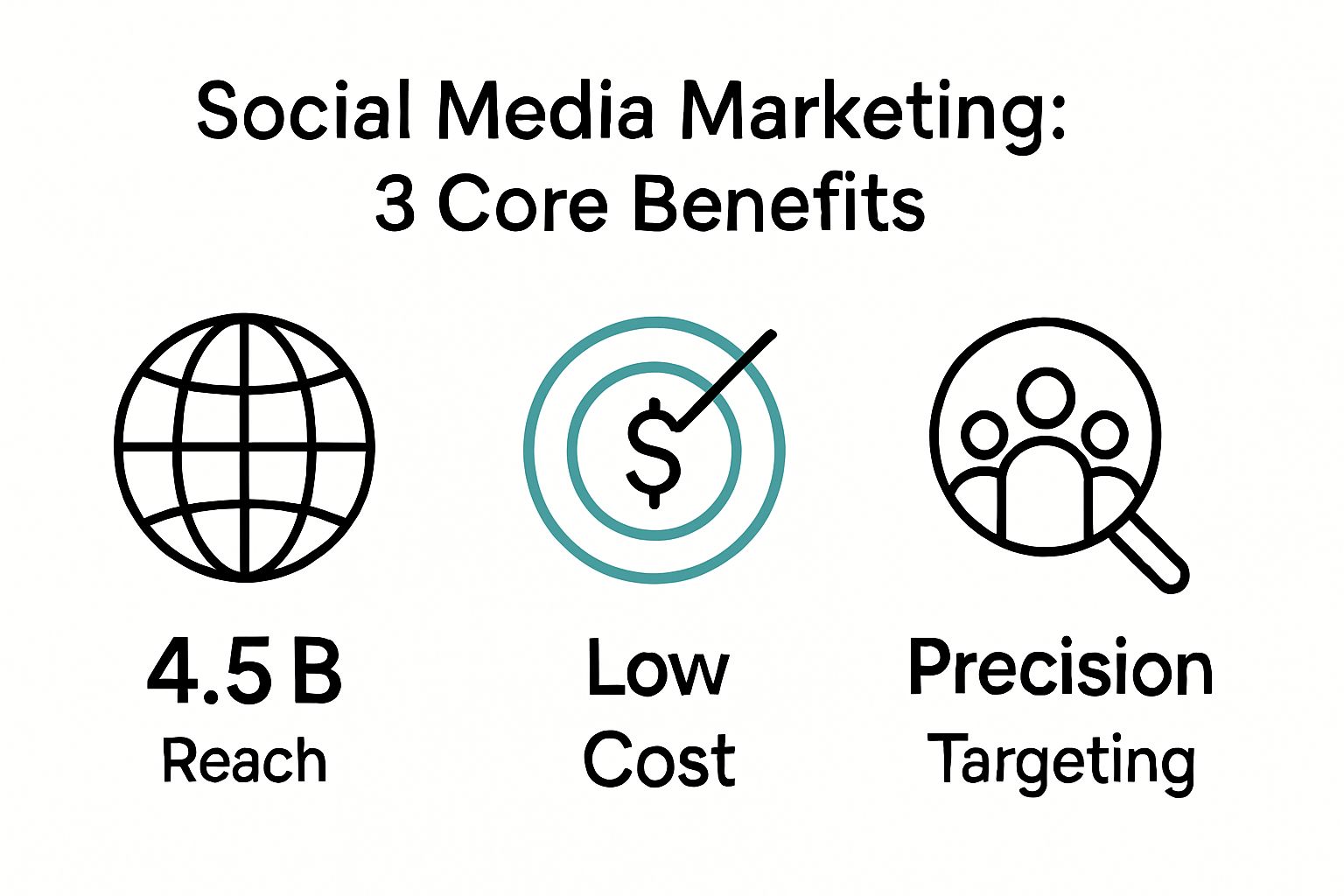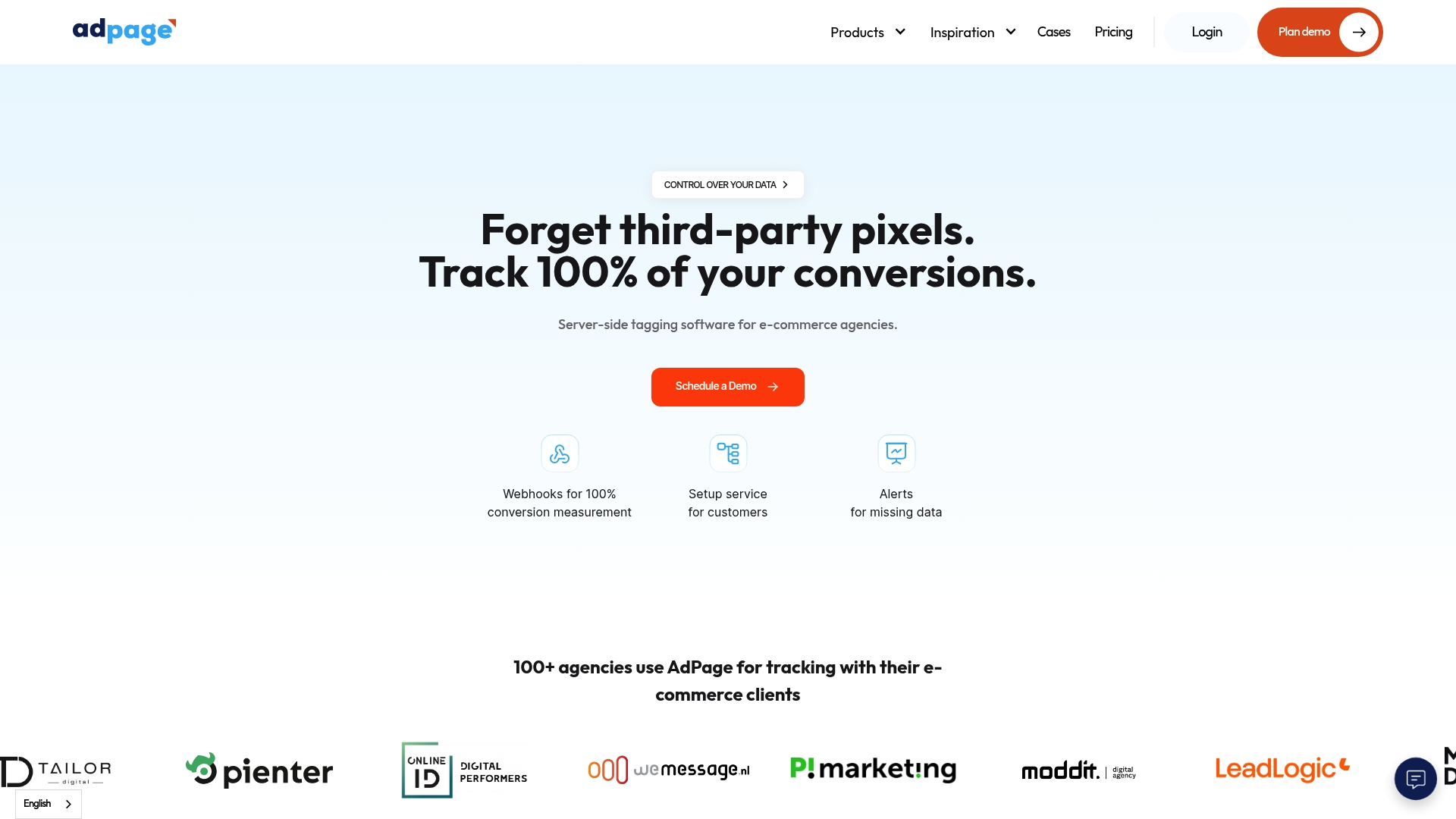Everyone seems glued to social media these days and brands are catching on fast. But while it might look like endless scrolling and quick chats, something much bigger is happening right behind the scenes. Over 4.5 billion people worldwide use social media, turning every like and comment into a real business opportunity. What really surprises most is that these platforms are not just for promotion. They open doors to genuine conversations and instant feedback that traditional marketing could only dream of.
Table of Contents
- Defining Social Media Marketing And Its Purpose
- The Importance Of Social Media Marketing For Brands
- Key Platforms And Their Unique Attributes
- Understanding Audience Engagement And Analytics
- Integrating Social Media Into Overall Marketing Strategy
Quick Summary
| Takeaway | Explanation |
|---|---|
| Leverage social media for engagement | Use platforms to connect and communicate directly with your audience. |
| Focus on measurable objectives | Set specific goals like brand visibility and lead generation to track success. |
| Understand platform demographics | Select social media platforms based on their user characteristics to target effectively. |
| Integrate social media within marketing | Ensure social media strategies align with overall marketing goals for cohesive messaging. |
| Utilise analytics for audience insight | Use engagement metrics to inform strategies and understand customer behaviour better. |
Defining Social Media Marketing and Its Purpose
Social media marketing represents a strategic digital approach where businesses leverage online platforms to connect, engage, and communicate with their target audiences. Unlike traditional marketing methods, social media marketing transforms communication from a one-way broadcast into an interactive dialogue between brands and consumers.
Understanding the Core Concept
At its fundamental level, social media marketing involves creating and sharing content across social media networks to achieve specific marketing and branding objectives. These platforms provide unprecedented opportunities for businesses to reach potential customers, build brand awareness, and drive meaningful engagement.
Key characteristics of social media marketing include:
- Targeted content creation
- Real-time audience interaction
- Measurable performance metrics
- Cost-effective communication channels
Strategic Objectives and Potential
Businesses utilise social media marketing to accomplish multiple strategic goals. According to Sprout Social’s Marketing Report, companies primarily aim to increase brand visibility, generate leads, and develop stronger customer relationships through these digital channels.
The purpose extends beyond mere promotional activities. Social media marketing enables organisations to:
The following table summarises the key strategic objectives and core benefits that businesses gain through social media marketing, organising information discussed in the prior section.
| Strategic Objective | Core Benefit Provided |
|---|---|
| Increase brand visibility | Reach a wide, targeted audience |
| Strengthen customer relationships | Build loyalty and trust through engagement |
| Generate leads | Attract potential customers directly |
| Provide customer support | Offer immediate assistance and contact |
| Humanise brand personality | Foster authenticity and relatability |
| Understand customer preferences | Gain real-time feedback and market insights |
- Understand customer preferences through direct feedback
- Humanise their brand personality
- Provide immediate customer support
- Create community around their products or services
By integrating social media marketing strategies, businesses can transform digital interactions into meaningful connections that drive growth and customer loyalty. Learn more about data-driven marketing strategies to enhance your approach and maximise digital engagement potential.
The Importance of Social Media Marketing for Brands
Social media marketing has evolved from a supplementary communication strategy to a critical business imperative for organisations seeking sustainable growth and competitive advantage in the digital marketplace.
Economic and Reach Potential
In the contemporary digital ecosystem, social media platforms offer unparalleled opportunities for brands to expand their market presence. According to Hootsuite’s Global Digital Report, over 4.5 billion people worldwide use social media, representing an extraordinary potential audience for businesses willing to invest strategically.
Key economic advantages include:

- Unprecedented global reach
- Significantly reduced marketing expenditure
- Precise audience targeting capabilities
- Direct engagement with potential customers
Brand Building and Customer Relationship Management
Beyond pure economic metrics, social media marketing fundamentally transforms how brands construct and maintain their public identity. Organisations can now craft nuanced narratives, showcase their values, and build genuine connections with audiences in real-time.
Strategic benefits encompass:
- Enhanced brand recognition
- Improved customer trust and loyalty
- Rapid feedback and sentiment analysis
- Opportunities for personalised communication
By embracing social media marketing, brands can transcend traditional communication barriers and create meaningful, interactive relationships with their audiences. Explore advanced online marketing techniques to further refine your digital strategy and maximise engagement potential.
The transformative power of social media marketing lies not just in broadcast capabilities, but in its ability to foster genuine, two-way dialogues between brands and consumers.
Key Platforms and Their Unique Attributes
The social media landscape comprises diverse platforms, each offering distinct capabilities and audience engagement opportunities for digital marketers. Understanding these nuanced differences is crucial for developing targeted communication strategies.
Content-Driven Platforms
Some social media networks prioritise specific content formats and user interactions. According to Statista’s Social Media Usage Report, these platforms demonstrate unique characteristics that businesses can strategically leverage.
Key content-driven platforms include:
- Instagram: Visual storytelling and aesthetic brand representation
- LinkedIn: Professional networking and B2B communication
- TikTok: Short-form video content and viral trend engagement
- YouTube: Long-form video content and educational material
Audience Targeting and Demographic Insights
Each social media platform attracts distinct demographic segments, enabling precise audience targeting. Marketing professionals can select platforms based on their specific user characteristics and behavioural patterns.
To clarify the distinctions and audience focus of each major social media platform mentioned, the following table compares their primary content style and demographic appeal.
| Platform | Primary Content Style | Key Audience Demographics |
|---|---|---|
| Visual storytelling, imagery | Younger adults, creatives | |
| Professional networking, articles | Professionals, B2B, jobseekers | |
| TikTok | Short-form video, viral trends | Teenagers, Gen Z, young adults |
| YouTube | Long-form video, educational | Broad, all ages, knowledge seekers |
Demographic considerations include:
- Age range of primary users
- Professional background
- Consumption preferences
- Engagement patterns
Explore the potential of influencer marketing strategies to further enhance your platform-specific approach and maximise digital engagement.
Successful social media marketing requires a nuanced understanding of platform dynamics, audience expectations, and content adaptation strategies that resonate with specific user communities.
Understanding Audience Engagement and Analytics
Audience engagement and analytics represent the critical intersection of data-driven insights and strategic marketing communication. By comprehensively understanding user interactions, businesses can transform raw data into actionable marketing intelligence.
Measuring Digital Interactions
Effective social media analytics transcend simple view counts, diving deep into complex user behaviour patterns. According to Google Analytics Research, meaningful engagement metrics provide nuanced perspectives on audience connections.
Key performance indicators include:
- Interaction rate
- Engagement duration
- Content share frequency
- Conversion potential
Advanced Analytical Frameworks
Modern social media analytics employ sophisticated tracking mechanisms that offer granular insights into audience preferences. Marketers can now understand not just what audiences view, but how and why they interact with specific content.
Comprehensive analytical approaches evaluate:
- Demographic segmentation
- Behavioural patterns
- Sentiment analysis
- Predictive engagement models
Learn advanced digital marketing analytics strategies to transform your data interpretation capabilities and develop more targeted marketing approaches.
Successful audience engagement requires continuous measurement, iterative learning, and a willingness to adapt strategies based on empirical insights derived from comprehensive analytical frameworks.

Integrating Social Media into Overall Marketing Strategy
Successful social media integration demands a holistic approach that seamlessly connects digital platforms with broader organisational marketing objectives. This strategic alignment transforms social media from an isolated tactic into a powerful, interconnected communication mechanism.
Comprehensive Strategic Planning
Effective integration requires meticulously mapping social media initiatives across existing marketing channels. According to Content Marketing Institute’s Research, organisations that develop integrated strategies experience significantly enhanced marketing performance and brand consistency.
Key strategic alignment considerations include:
- Consistent brand messaging across platforms
- Unified communication tone
- Cross-channel campaign synchronisation
- Integrated performance measurement
Synchronising Digital Touchpoints
Modern marketing strategies necessitate breaking down traditional channel silos. Social media must function as a complementary element within a broader digital ecosystem, connecting with email marketing, website content, paid advertising, and customer relationship management systems.
Critical integration approaches encompass:
- Leveraging user data across platforms
- Creating cohesive customer journey experiences
- Developing omnichannel communication strategies
- Implementing unified tracking mechanisms
Discover advanced digital marketing strategies for growth to enhance your integrated marketing approach and maximise cross-channel potential.
Integrating social media effectively requires continuous adaptation, strategic thinking, and a commitment to understanding how different marketing channels can work synergistically to achieve organisational objectives.
Boost Your Social Media Marketing Results with Flawless Conversion Tracking
After understanding the basics of social media marketing, it is clear that accurate measurement and data-driven action are essential for true success. Many marketers struggle with data gaps, missed conversions, and unreliable analytics, all of which can undermine the impact of their social media campaigns. Without precise conversion tracking, your ability to optimise content, target the right audience, and prove your return on investment is severely limited. The article highlights the need for real-time analytics, accurate performance metrics, and integrated strategies—yet these are impossible to achieve with fragmented data.
This is where AdPage empowers you.
- Achieve 100 percent conversion monitoring and never lose valuable insights to browser restrictions or ad blockers.
- Benefit from server-side tagging, GDPR-compliant data management, and seamless integration with leading e-commerce platforms.
- Harness robust reporting tools to transform your engagement data into actionable marketing intelligence and stronger campaign results.
Take your learnings from social media basics and turn them into true business growth.

Are you ready to unlock complete clarity into your social media performance? Visit AdPage to see how our platform helps you overcome conversion tracking challenges and optimise every campaign. Discover our solutions today to stop missing opportunities and start making every interaction count. Experience the power of precise data—get started with AdPage now.
Frequently Asked Questions
What is social media marketing?
Social media marketing is the process of using online platforms to create and share content that engages target audiences. To get started, identify your key platforms and establish a content plan that aligns with your marketing objectives.
How can I measure the success of my social media marketing efforts?
You can measure success by tracking engagement metrics such as interaction rates, content shares, and conversion rates. Set specific goals and review your performance data weekly to assess what content resonates most with your audience.
What are the key components of an effective social media marketing strategy?
An effective social media marketing strategy includes targeted content creation, audience engagement, and performance metrics monitoring. Begin by defining your target audience, crafting tailored messages, and choosing the right platforms to reach them.
How do I choose the right social media platforms for my business?
Select social media platforms based on your target audience’s demographics and engagement preferences. Research the primary user age ranges and professional backgrounds of each platform to identify where to focus your marketing efforts.
What types of content should I share on social media?
You should share a mix of informative, entertaining, and promotional content tailored to your audience’s interests. Develop a content calendar that incorporates different formats like videos, images, and articles to maintain engagement.
How often should I post on social media to be effective?
Aim to post consistently, ideally several times a week, while adjusting frequency based on audience engagement levels. Track your post performance to optimise your schedule for the best results, refining your strategy every month.



.png)
